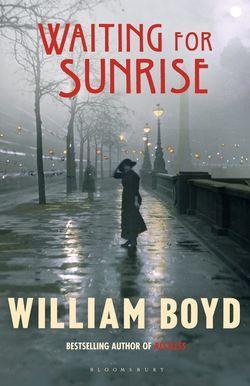
It is a clear and dazzling summer's day in Vienna. You are standing in a skewed pentangle of lemony sunshine at the sharp corner of Augustiner Strasse and Augustinerbastei, across from the opera house, indolently watching the world pass you by, waiting for someone or something to catch and hold your attention, to generate a tremor of interest. There's a curious frisson in the city's atmosphere today, almost spring-like, though spring is long gone, but you recognize that slight vernal restlessness in the people going by, that stirring of potential in the air, that possibility of audacity...
Lovely lovely book!
It feels like a long time since I've felt able to say that. I've read most of William Boyd's novels, liked some more than others, but for some reason never reviewed one on here. Most of them must have been in pre-blogging days, and though I see I bought Restless in 2007 I didn't write about it for some reason. Anyway, my daughter, whose opinion I trust implicitly, gave me this for Christmas, and I've just finished it.
The novel starts in Vienna in 1913. A young actor, Lysander Reif, has come to the city to consult an eminent psychoanalyst about a very intimate and distressing problem which, the doctor tells him, is called anorgasmia. Lysander is engaged to beautiful Blanche, a fellow actor, and wants to get himself sorted out before the wedding. But everything changes even before the consultation, as Lysander meets, in the waiting room, a young English woman called Hettie Bull. Hettie, who lives with a bad-tempered sculptor, is clearly unstable, but, despite not being Lysander's type (small and dark rather than tall and blonde), she manages to get him into bed and the two start an intensely passionate affair, one result of which is that Lysander's problem disappears in an instant, never to return. But events in Vienna take a dramatic turn, and Lysander narrowly escapes a very serious situation and finds his way back to London. Then it is 1914, and Lysander gets caught up in the war in various unusual and often threatening and upsetting ways, culminating in an involvement in military intelligence which ends up being closer to home than he could ever have imagined.
So why did I love this novel so much? Well, William Boyd writes really well -- not obtrusively beautiful prose but just consistently intelligent, perceptive and enjoyable to read. Then the story is attractively unpredictable, with many unexpected twists and turns. And, perhaps above all, Boyd has achieved something that I think only the best writers can do -- a wonderful multiplicity of tone. Sometimes the novel is comic, sometimes serious, sometimes tense or threatening, and sometimes all of these combined. And he does this, I think, by filtering events through Lysander himself. Mostly the novel is told in the third person, though there are some chapters which are extracts from Lysander's 'Autobiographical Investigations'. But always the reader is inside Lysander's head, seeing things through his eyes, filtering them through his often slightly confused consciousness. Lysander is a delight, or was so to me -- an actor, the son of a famous actor and an equally famous singer, he is constantly aware of his lack of a proper education. Far from stupid, he is nevertheless often puzzled by the turn events are taking, and -- as befits someone in the new age of psychoanalysis -- tries to make sense of his reactions to it all. Of course despite his attempts at self-analysis he is frequently swept away by his feelings and emotions, but though he gets into some quite sticky situations he is fundamentally a good and honest man and his aim, or one of them, seems to be to try to reach some kind of 'truth'. Whether he has reached it by the end of the novel is dubious -- he has certainly changed, but Boyd leaves us with a very ambiguous final view of him, as
a man who evidently prefers the fringes and edges of the city streets, its blurry periferies - where its hard to make things out clearly, hard to tell exactly what is what, and who is whom -- Mr Lysander Reif looks like someone who is far more at ease occupying the cold security of the dark; a man happier with the dubious comfort of the shadows.
There's so much to enjoy here. Some wonderfully conceived characters -- amoral, addicted Hetty, for one, but also the mysterious Madame Duschene, who Lysander is much attracted to despite the fact that she once tried to murder him, Lysander's beautiful, rather mysterious mother, and an amazing cast of British diplomats, all in varying degrees deeply untrustworthy. The historical background -- hardly a background since it is so essential to the plot -- is brilliantly evoked, whether pre-war Vienna or wartime Normandy and England. Well, you can tell I liked it. Highly recommended.
